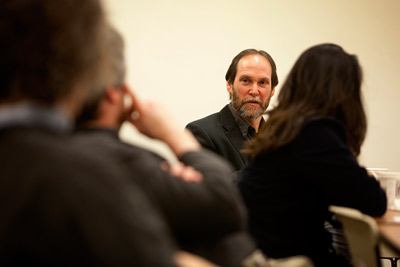Evangelista: Stigmatize nuclear weapons as genocidal, then abolish them
By Linda Glaser

The United States still asserts that nuclear weapons play an important role in national security. That is just one major obstacle to achieve nuclear disarmament, said Matthew Evangelista, the President White Professor of History and Political Science, at a Peace Studies Program seminar Feb. 18.
Despite Barack Obama being the first president to endorse full nuclear disarmament, Evangelista pointed out that the president has also said, "we will retain our deterrent capacity as long as there is a country with nuclear weapons."
Pointing out what the government means by deterrence, Evangelista quoted the 2009 Air Force Doctrine on nuclear operations: "because U.S. policy precludes an in-kind response to chemical and biological weapons, the U.S. maintains credible nuclear forces as a deterrent against all forms of WMD [weapons of mass destruction]."
The "national military strategy of the United States," Evangelista continued, defines weapons of mass destruction as "chemical, biological, radiological, nuclear and enhanced high explosive weapons as well as other, more asymmetrical 'weapons'" -- weapons that rely more on disruptive impact than destructive kinetic effects, such as cyber attacks on U.S. commercial information systems, he said. That the military would consider dropping a nuclear bomb in response to computer hacking was met with dismay by many in the packed Uris Hall seminar room.
Evangelista emphasized that nuclear weapons are not effective restraints for 21st-century threats; he noted with grim humor that nuclear bombs are no deterrent to terrorists who plan on dying anyway. And the risk of terrorists acquiring nuclear weapons has only increased.
To make progress toward nuclear disarmament, Evangelista said, the United States has to change how it thinks about nuclear weapons; it needs to transform nuclear weapons from symbols of power and prestige into symbols of mass destruction and genocide, he said.
Evangelista's solution to nuclear disarmament: Stigmatize nuclear weapons as instruments of genocide and create a worldwide movement to demand their total abolition. He finds room for hope in Obama's statement that "moral leadership is more powerful than any weapon. As the only nuclear power to have used a nuclear weapon, the United States has a moral responsibility to act."
Caroline Clark '10, a government and anthropology dual major, has been attending Peace Studies luncheons since her sophomore year. "I try to work my schedule out every semester to attend," she said. "It's really a pleasure to hear all the different perspectives and opinions."
Clark felt that because many of the faculty present at Evangelista's talk did their graduate work when nuclear disarmament was a hot issue, the discussion was particularly interesting. "A lot of people now don't think about the subject, but we need to, especially when Obama is saying we need to decrease nuclear weapons, not go to zero," she said.
Many practical issues were raised in response to Evangelista's presentation, such as how to verify that nuclear disarmament has taken place. One professor questioned whether nuclear weapons would become proportionately more valuable as countries owned fewer of them; another asked whether countries ever give up technologies that they find valuable without finding other technologies to replace them. Evangelista responded by drawing parallels between nuclear weapons as deterrents and other practices that had once been considered normal, like slavery or torture. Once the weapon is positioned as evil, he claimed, society will enforce its abolition.
Linda Glaser is a staff writer in the College of Arts and Sciences.
Media Contact
Get Cornell news delivered right to your inbox.
Subscribe